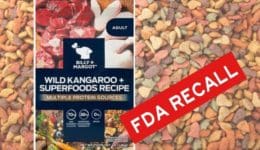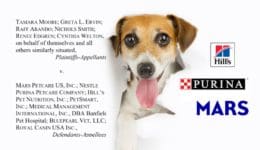Nationally sold ‘raw kangaroo’ dog food recalled for possible salmonella
The Real Pet Food Company of Phoenix, Arizona has recalled Billy+Margot Wild Kangaroo and Superfoods Recipe Dog Food because of […]

The Real Pet Food Company of Phoenix, Arizona has recalled Billy+Margot Wild Kangaroo and Superfoods Recipe Dog Food because of […]

FDA spox tells TCR, “FDA has received at least one report about Sunshine Mills products in that timeframe…” In both recalls, the major pet food company noted that “no illnesses have been reported in association with these products to date.” That’s a statement Sunshine may no longer be able to make.

Americans may have less money to spend, but what they have, they appear to be spending on their dogs and more notably, on pet health insurance, a relatively small but exponentially growing market as Americans discover that their dog’s health insurance policy can be better than any policy the human members of their families have access to….

A class action suit against sellers of prescription pet food (including Mars, Hill’s, Purina, two veterinary hospital networks, and retailer Petsmart) that was filed by six California dog and cat owners in 2016 was revived by a federal court last week, overturning a district court ruling. The claims are based on California consumer protection laws.

The Mountain View Voice is reporting today that although California veterinarian Tejpaul Ghumman’s license was revoked by the state’s Veterinary Medical Board (VMB) earlier this month along with his ‘premise license’ to operate Alta View Animal Hospital, which he co-owns, Alta View Animal Hospital continues to be open for business and Ghumman is continuing to work there.

TCR is requesting a correction or clarification in a VIN News story by reporter Edie Lau. Lau has not yet made any changes to her story, nor has she responded to TCR’s most recent e-mail. TCR is publishing the exchange with Lau in full:

On Monday morning, Oxford University Press chief executive officer Nigel Portwood declined to answer questions about how OUP supervises its journals and oversees its policies with regard to conflicts of interest and disclosure. His answer was limited to an apparent acquiescence to the Journal of Animal Science’s limited addendum ‘for clarity,’ which did not concede or specify the authors’ direct conflict of interest in a controversial article about canine dilated cardiomyopathy (DCM) – a progressive heart disease that can eventually lead to congestive heart failure – and possible links to certain types of diets.

Controversy is swirling around a prominent science journal’s article that defends the pet food industry against charges that one of its products endangers canines. Last week, the Journal of Animal Science — which describes itself on its website as “one of the most frequently cited peer-reviewed, agriculturally oriented research journals in the world” — and whose publisher is Oxford University Press — published an article that seeks to debunk the U.S. Food and Drug Administration’s reports about its investigations into cases of canine dilated cardiomyopathy (DCM) – a progressive heart disease that can eventually lead to congestive heart failure – and possible links to certain types of diets.

On June 22, following the publication of our report on an article in the Journal of Animal Science, we received a letter from the Journal. It is reprinted below, along with our reply. Story to follow this evening.

Buzz is building in veterinary circles over a study published in a prestigious academic journal. This week a group of veterinary academics published an article under the auspices of Oxford University Press’ Journal of Animal Science declaring no link between grain-free diet and canine dilated cardiomyopathy (DCM).